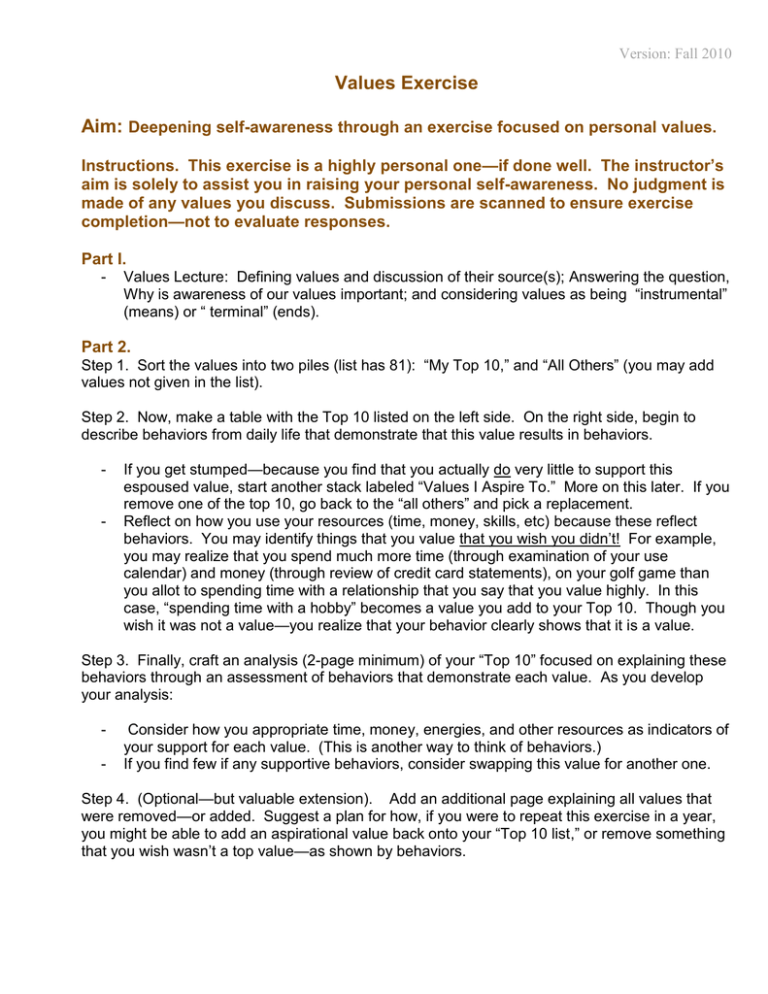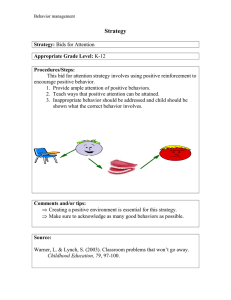Values Exercise Aim:
advertisement

Version: Fall 2010 Values Exercise Aim: Deepening self-awareness through an exercise focused on personal values. Instructions. This exercise is a highly personal one—if done well. The instructor’s aim is solely to assist you in raising your personal self-awareness. No judgment is made of any values you discuss. Submissions are scanned to ensure exercise completion—not to evaluate responses. Part I. - Values Lecture: Defining values and discussion of their source(s); Answering the question, Why is awareness of our values important; and considering values as being “instrumental” (means) or “ terminal” (ends). Part 2. Step 1. Sort the values into two piles (list has 81): “My Top 10,” and “All Others” (you may add values not given in the list). Step 2. Now, make a table with the Top 10 listed on the left side. On the right side, begin to describe behaviors from daily life that demonstrate that this value results in behaviors. - - If you get stumped—because you find that you actually do very little to support this espoused value, start another stack labeled “Values I Aspire To.” More on this later. If you remove one of the top 10, go back to the “all others” and pick a replacement. Reflect on how you use your resources (time, money, skills, etc) because these reflect behaviors. You may identify things that you value that you wish you didn’t! For example, you may realize that you spend much more time (through examination of your use calendar) and money (through review of credit card statements), on your golf game than you allot to spending time with a relationship that you say that you value highly. In this case, “spending time with a hobby” becomes a value you add to your Top 10. Though you wish it was not a value—you realize that your behavior clearly shows that it is a value. Step 3. Finally, craft an analysis (2-page minimum) of your “Top 10” focused on explaining these behaviors through an assessment of behaviors that demonstrate each value. As you develop your analysis: - Consider how you appropriate time, money, energies, and other resources as indicators of your support for each value. (This is another way to think of behaviors.) If you find few if any supportive behaviors, consider swapping this value for another one. Step 4. (Optional—but valuable extension). Add an additional page explaining all values that were removed—or added. Suggest a plan for how, if you were to repeat this exercise in a year, you might be able to add an aspirational value back onto your “Top 10 list,” or remove something that you wish wasn’t a top value—as shown by behaviors. Version: Fall 2010 PERSONAL VALUES (81 total) Source: W.R. Miller, J. C’de Baca, D.B. Matthews, P.L. Wilbourne University of New Mexico, 2001 ACCEPTANCE to be accepted as I am ACCURACY to be accurate in my opinions and beliefs AUTONOMY to be self-determined and independent ACHIEVEMENT to have important accomplishments ADVENTURE to have new and exciting experiences ATTRACTIVENESS to be physically attractive AUTHORITY to be in charge of and responsible for others BEAUTY to appreciate beauty around me CARING to take care of others CHALLENGE to take on difficult tasks and problems CHANGE to have a life full of change and variety COMFORT to have a pleasant and comfortable life COMMITMENT to make enduring, meaningful commitments COMPASSION to feel and act on concern for others in the world CONTRIBUTION to make a lasting contribution COOPERATION to work collaboratively with others COURTESY to be considerate and polite toward others CREATIVITY to have new and original ideas DEPENDABILITY to be reliable and trustworthy EXCITEMENT to have a life full of thrills and stimulation DUTY to carry out my duties and obligations ECOLOGY to live in harmony with the environment FAITHFULNESS to be loyal and true in relationships FAME to be known and recognized FAMILY to have a happy, loving family FITNESS to be physically fit and strong FLEXIBILITY to adjust to new circumstances easily FORGIVENESS to be forgiving of others FRIENDSHIP to have close, supportive friends Version: Fall 2010 FUN to play and have fun GENEROSITY to give what I have to others GENUINENESS to act in a manner that is true to who I am GOD’S WILL to seek and obey the will of God GROWTH to keep changing and growing HEALTH to be physically well and healthy HELPFULNESS to be helpful to others HONESTY to be honest and truthful HOPE to maintain a positive and optimistic outlook HUMILITY to be modest and unassuming HUMOR to see the humorous side of myself and the world INDEPENDENCE to be free from dependence on others INDUSTRY to work hard and well at my life tasks INNER PEACE to experience personal peace INTIMACY to share my innermost experiences with others JUSTICE to promote fair and equal treatment for all KNOWLEDGE to learn and contribute valuable knowledge LEISURE to take time to relax and enjoy LOVED to be loved by those close to me LOVING to give love to others MASTERY to be competent in my everyday activities MINDFULNESS to live conscious and mindful of the present moment MODERATION to avoid excesses and find a middle ground MONOGAMY to have one close, loving relationship NON-CONFORMITY to question and challenge authority and norms NURTURANCE to take care of and nurture others OPENNESS to be open to new experiences, ideas, and options ORDER to have a life that is well-ordered and organized PASSION to have deep feelings about ideas, activities, or people PLEASURE to feel good POPULARITY to be well-liked by many people POWER to have control over others Version: Fall 2010 PURPOSE to have meaning and direction in my life RATIONALITY to be guided by reason and logic REALISM to see and act realistically and practically RESPONSIBILITY to make and carry out responsible decisions RISK to take risks and chances ROMANCE to have intense, exciting love in my life SELF-ACCEPTANCE to accept myself as I am SAFETY to be safe and secure SELF-CONTROL to be disciplined in my own actions SELF-ESTEEM to feel good about myself SELF-KNOWLEDGE to have a deep and honest understanding of myself SERVICE to be of service to others SEXUALITY to have an active and satisfying sex life SIMPLICITY to live life simply, with minimal needs SOLITUDE to have time and space where I can be apart from others SPIRITUALITY to grow and mature spiritually STABILITY to have a life that stays fairly consistent TOLERANCE to accept and respect those who differ from me TRADITION to follow respected patterns of the past VIRTUE to live a morally pure and excellent life WEALTH to have plenty of money WORLD PEACE to work to promote peace in the world Version: Fall 2010 What About Me? Values and Attitude Insights WHAT DO I VALUE? Listed below are two sets of statements. The first list presents 10 terminal values. These are desirable end-states of existence. Think of them as goals that you might like to achieve during your lifetime. The second list presents 10 instrumental values. These are preferable modes of behavior, or means of achieving the terminal values. For each list, rank-order the statements according to how important each is to you personally. Score a "1" next to the value that is most important, a "2" next to the second most important, and so forth. Treat each list separately. Terminal Values … “end-states of existence.” Examples of terminal values ___ Happiness; satisfaction in life ___ Knowledge and wisdom ___ Peace and harmony in the world ___ Pride in accomplishment ___ Prosperity; wealth ___ Lasting friendships ___ Recognition from peers ___ Salvation; finding eternal life ___ Security; freedom from threat ___ Self-respect ___ __________________________ ___ __________________________ Instrumental Values … “means of achieving the terminal values.” Examples for consideration ___ Assertiveness; standing up for yourself ___ Being helpful or caring toward others ___ Dependability; being counted upon by others ___ Education and intellectual pursuits ___ Hard work and achievement ___ Obedience; following the wishes of others ___ Open-mindedness; receptivity to new ideas ___ Self-sufficiency; independence ___ Truthfulness; honesty ___ Being well-mannered and courteous toward others ___ _____________________________ Version: Fall 2010 ___ _____________________________ Discussion Questions. Develop a solution on your own, then compare with your team. 1. What assumptions are “underneath” each of the values? 2. What are key values that are missing from the list given? 3. For each of the values mentioned above, try to identify how your current day-today behaviors either demonstrate how strongly your “walk matches the talk.” 4. How might this value lead to organizational efficiency or dysfunction when you compare your “scores” and the resulting behavior to that of others you interact with. Source: Based on M. Rokeach, THE NATURE OF HUMAN VALUES (New York: Free Press, 1973).
